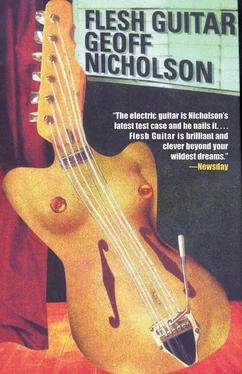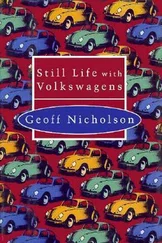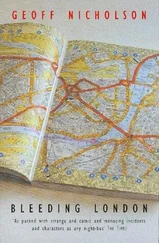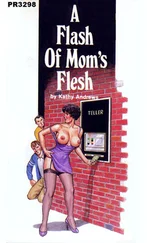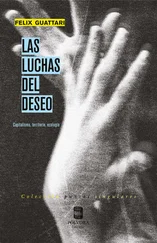‘I don’t know why it should be so unusual for a woman to do that, but it is. The very idea of Jenny Slade, guitar heroine, seems utterly strange, utterly subversive. Sometimes it seems inconceivable, like science fiction or something, but there’s Jenny Slade confirming that it’s all possible and true.’
‘Hold on,’ says Kate, ‘that wasn’t exactly what happened here tonight. She didn’t exactly turn up to twelve, put her foot up and give it some welly at all. It was far spookier than that.’
‘Precisely,’ Bob says with delight and triumph. ‘That’s why she’s special. She’s so infinitely surprising, so infinitely various. Whatever expectations you have she confounds them, yet she still delivers. She doesn’t just give you what you want, she gives you what you never even knew existed or even thought was possible. But once she’s delivered it, you realize it was what you wanted all along.’
Kate nods. What he says makes surprising sense. What he’s described is precisely the experience she had earlier that night. He’s not only explaining Jenny Slade, he’s also explaining Kate’s own feelings. He may look like a joke but he knows his stuff.
‘Have you ever met her?’ she asks.
‘Of course. I am her number one fan, after all.’
He digs in his briefcase and produces an autograph album. He opens it, and there on the first page it says, ‘To Bob Arnold, my number one fan. Love, Jenny Slade’.
‘Well, I guess that proves it,’ Kate says, unimpressed.
‘No, that doesn’t prove it,’ he snarls defensively.
‘What proves it is that I have here two hundred Jenny Slade autographs,’ and he flips the pages of the book so that she can see Jenny Slade’s autograph on every page.
Kate, naturally, still doesn’t think that proves anything except that Bob is obsessive and weird, so he tries another technique.
‘I’ll convince you,’ he says. ‘I have all her recordings, OK? How’s that for starters? And I do mean all of them, in all formats and all sort of pressings, all the remixes and all the bonus tracks, all the picture discs and fold-out sleeves, the rare imported box sets, promotional items, Japanese twelve inchers, radio edits. I have acetates and bootlegs and unreleased demos.’
‘OK,’ Kate says, a little impressed, prepared to allow that this is some reasonable definition of fandom.
‘But that’s only the tip of the iceberg,’ Bob laughs. ‘There’s all the merchandise too. I buy the goods: the T-shirts, the baseball caps, the posters, the concert programmes I snip cuttings out of magazines and stick them in scrapbooks; dozens of scrapbooks. I hang out at record fairs and swap meets, looking for those unknown, unlisted rarities. I communicate with other fans, by post, by fax, by Internet, arguing with them to prove that my fandom is predominant.
‘I’ve been to hundreds of Jenny Slade gigs, of course. I’ve travelled tens of thousands of miles to see her. I’ve got thirty or so plectrums and a dozen or more broken strings that I’ve picked up off the stage after gigs. I have her used towels and sweat bands, and even a grubby T-shirt she threw into the audience at a concert in Bruges. I had to fight dirty to get that.
‘Maybe all that makes me a bit of an anorak, but at least it’s an anorak with a picture of Jenny Slade appliqued on the back.’
‘OK, you’re her number one fan,’ Kate concedes.
‘And,’ Bob adds passionately, ‘as if that wasn’t enough I came to this hell-hole trying to see her play, didn’t I?’
Kate considers this and is doubly, triply, impressed. She has to admit that coming all this way to the Havoc Bar and Grill, to a place where they’d normally eat people like him alive, for a performance that was neither advertised nor expected does show a formidable degree of commitment, of manic fandom.
‘But if you really want to see how great my fandom is,’ Bob says determinedly, ‘all you have to do is read this.’
He puts a copy of a magazine on the bar. It’s a fanzine, not badly produced, well printed, neatly designed, and bearing the title JOSS.
‘Joss?’ Kate asks.
Journal of Sladean Studies. Jenny Slade. Get it?
‘I get it all right.’
‘I wanted something with an academic ring to it. I’m the publisher, picture researcher, distributor, proof reader, fact checker and chief scribe. There’s something in here you ought to read.’
He opens the magazine, folds it at the appropriate page and turns it round for her to see. She looks at it quizzically. This night is getting more and more bizarre. She’s been asked to do some weird things by previous customers of the Havoc Bar and Grill, but reading articles in academic journals is the most bizarre yet. Nevertheless she looks at the piece, which is short; she looks at the time, which is still not all that late, and she decides she has nothing much to lose. She begins to read.
THE RECORD LIBRARY OF BABEL
(A true fan’s account)
The universe (which others call the ‘Record Library’) is composed of an indefinite and perhaps infinite number of hexagonal listening booths. (The term ‘Record Library’ may seem both archaic and anachronistic, given that vinyl has long since been abandoned and superseded by the compact disc. However the word ‘record’ remains the most appropriate, since the Library undoubtedly still contains recordings, and since it is also an agency of record.)
The layout of the booths is invariable. There is salmon-pink carpet, a leather couch and state-of-the-art listening equipment. The walls are soundproofed and in two of them, as well as in the floor and ceiling, there is a hatchway that leads into a sort of airlock which interconnects with other hexagonal listening booths, like a honeycomb. Within the booths are toilet facilities, and listeners can sleep comfortably enough on the sofas.
In each listening booth four walls have floor to ceiling storage units consisting of ten shelves. Each shelf then contains sixty single CDs and each CD lasts approximately seventy minutes. There is a letter or number on the spine of each CD case, but there is no packaging, no cover art, no liner notes and no track listings. These letters and numbers bear no apparent relation to the content of each disc, which consists solely and entirely of guitar solos.
Like all men of the Record Library, I have travelled in my youth. I wandered in search of inspiration, in search of a brand new, totally original guitar sound which would say and do it all. I visited listening booths at the far extremities of the system, pushed and exhausted myself. It was a long, hard struggle but worth it, since in the process I discovered the music of Jenny Slade.
Theories have always circulated about the nature, the extent and the ‘meaning’ of the Record Library. It has been much admired, much praised. People have dedicated far more of their lives to exploring its treasures than I have. The most fanatical have asserted that it is proof of the existence of God since (they argue) such a neat, vast and methodical library could only be created by a supreme being, and one who, incidentally, likes to rock. Man, the imperfect listener, the music enthusiast, the obsessive fan, is compelled to feel awe in the face of such a magnificent creation. He must also be content to realize that he will never fully know or comprehend it.
However, some generations ago, a Ph.D. student and part-time disc jockey called Lenny Detroit came across a set of compact discs, more challenging and abstract than most. He listened to them repeatedly and claimed to have discovered the secret of the Record Library.
He observed, reasonably enough, that all the recordings, that is all the guitar solos, in the Record Library were comprehensible in terms of the same elements: notes, intervals, rhythms, duration, harmonies, counterpoint and so on. However unusual or different the solos sounded, and even if they consciously avoided or excluded some of those elements, they could still be analysed and described in terms of them.
Читать дальше
